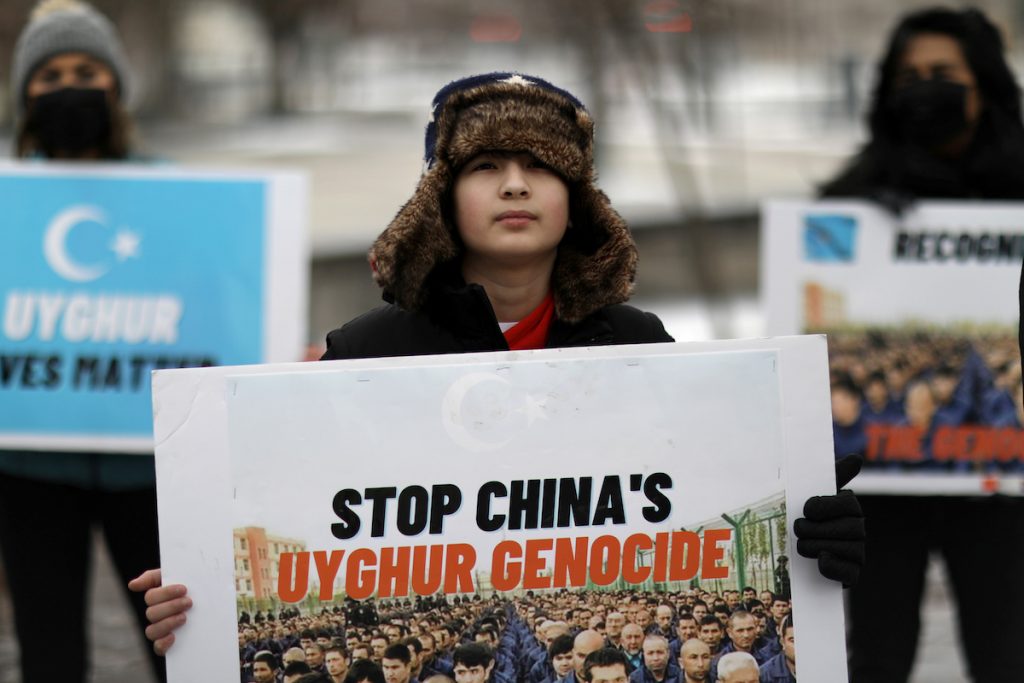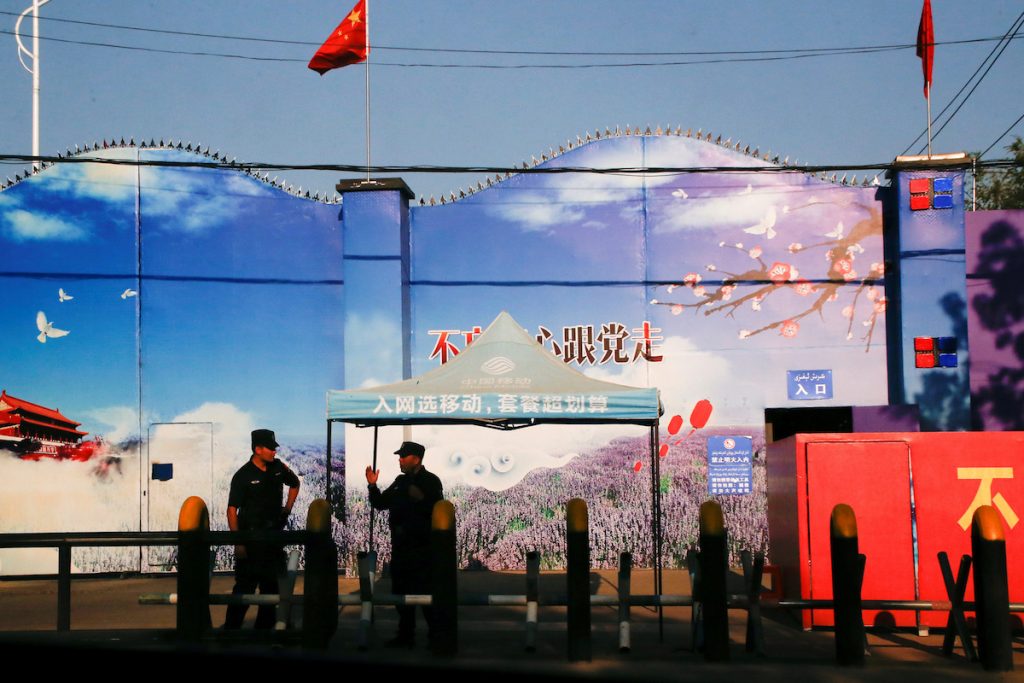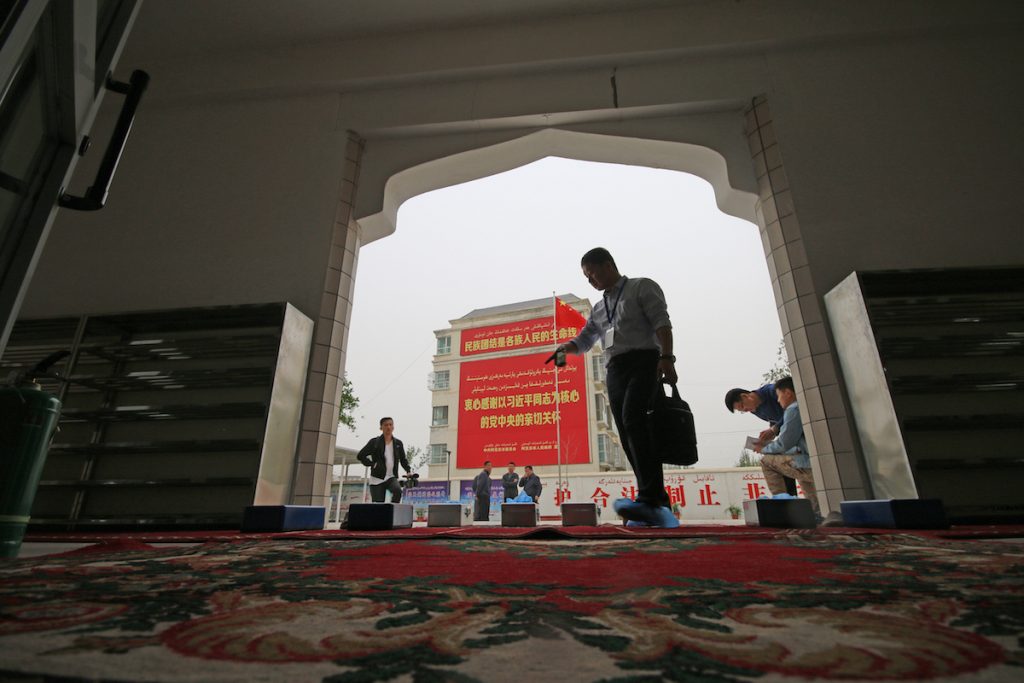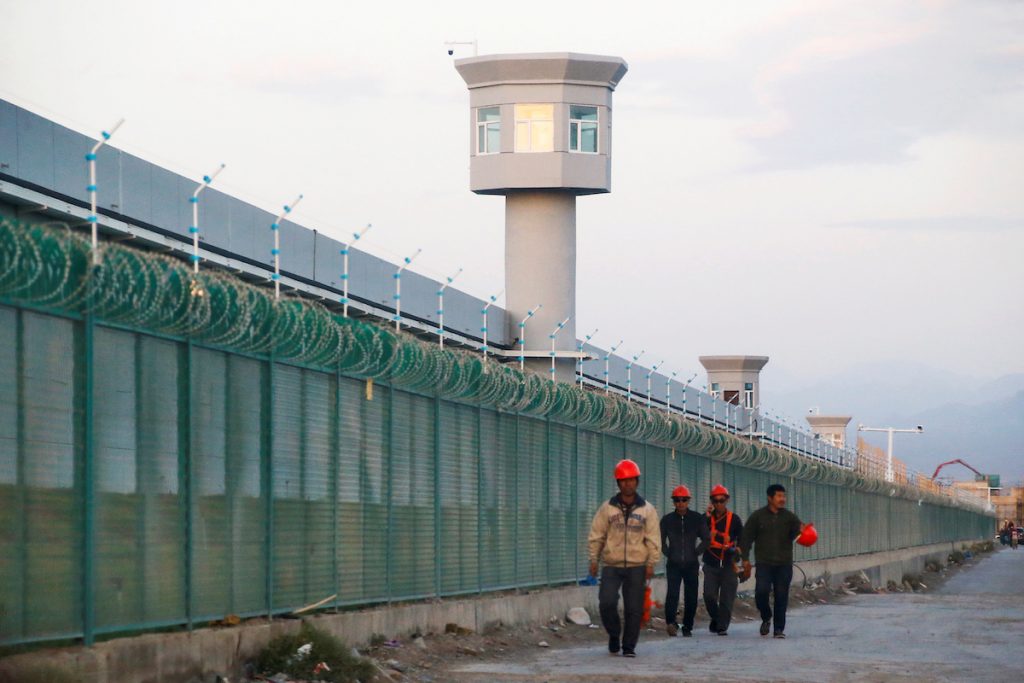The United States, the European Union, Britain and Canada have imposed sanctions on Chinese officials for human rights abuses in Xinjiang.
China’s ruling communists hit back immediately with punitive measures against the EU that appeared broader, including European lawmakers, diplomats, institutes and families, and banning their businesses from trading with China.
Western governments are seeking to hold Beijing accountable for mass detentions of Muslim Uyghurs and other religious minorities in northwestern China, where the United States says China is committing genocide.
The coordinated effort on March 22 appeared to be early fruit in a concerted US diplomatic push to confront China in league with allies, a core element of US President Joe Biden’s still evolving China policy.
Senior US administration officials have said they are in daily contact with governments in Europe on China-related issues, something they call the “Europe roadshow.”
“Amid growing international condemnation, (China) continues to commit genocide and crimes against humanity in Xinjiang,” US Secretary of State Antony Blinken said in statement ahead of meetings with EU and NATO ministers in Brussels this week.
Canada’s foreign ministry said: “Mounting evidence points to systemic, state-led human rights violations by Chinese authorities.”
An independent UN human rights panel said in 2018 that it had received credible reports that at least 1 million Uyghurs and other Muslims had been detained in Xinjiang.
Faith leaders, activist groups and others have said crimes against humanity, including genocide, are taking place in Xinjiang. In August, religious leaders, including Myanmar’s Cardinal Charles Bo and Indonesia’s Cardinal Ignatius Suharyo, said in an open letter that the “repression” in the region has become “one of the most egregious human tragedies since the Holocaust.”
After first denying their existence, communist China says its camps provide vocational training and are needed to fight extremism.

The European Union was the first to impose sanctions on four Chinese officials, including a top security director, and one entity, a decision later mirrored by Britain and Canada.
Those also targeted by the United States were Chen Mingguo, director of the Xinjiang Public Security Bureau and another senior official in the region, Wang Junzheng.
The United States had already last year designated for sanctions the top official in Xinjiang, Chen Quanguo, who was not targeted by the other Western allies on Monday, to avoid a larger diplomatic dispute, experts and diplomats said.
The foreign ministers of Canada and Britain issued a joint statement with Blinken, saying the three were united in demanding that Beijing end its “repressive practices” in Xinjiang.
Evidence of abuses was “overwhelming”, including satellite imagery, eyewitness testimony, and the Chinese government’s own documents, they said.
“We will continue to stand together to shine a spotlight on China’s human rights violations. We stand united and call for justice for those suffering in Xinjiang,” they added.
Separately, the foreign ministers of Australia and New Zealand issued a statement expressing “grave concerns about the growing number of credible reports of severe human rights abuses against ethnic Uyghurs and other Muslim minorities in Xinjiang” and welcoming the measures announced by Canada, the European Union, Britain and the US.

First major EU sanctions in decades
The move by the US and its allies follows two days of talks between US and Chinese officials last week, which laid bare the tensions between the world’s two largest economies.
The EU accused Chen Mingguo of “arbitrary detentions and degrading treatment inflicted upon Uighurs and people from other Muslim ethnic minorities, as well as systematic violations of their freedom of religion or belief”.
Others hit with travel bans and asset freezes were senior Chinese officials Wang Mingshan, the former deputy party secretary in Xinjiang, Zhu Hailun, and the Xinjiang Production and Construction Corps Public Security Bureau.
The EU has sought to avoid confrontation with Beijing and the March 22 sanctions were the first significant measures since the 1989 Tiananmen Square crackdown, although Brussels targeted two computer hackers and a technology firm in 2020 as part of broader cyber sanctions.
The steps were praised by the United States. “A united transatlantic response sends a strong signal to those who violate or abuse international human rights,” Blinken said.
While mainly symbolic, the EU sanctions mark a hardening towards China, which Brussels regarded as a benign trading partner but now views as a systematic abuser of rights and freedoms.
Britain has repeatedly denounced torture, forced labor and sterilizations that it says are taking place on an “industrial scale” in Xinjiang and repeated its criticism of Beijing on March 22.
UK Foreign Secretary Dominic Raab called the abuse of the Uyghurs in Xinjiang “one of the worst human rights crises of our time”.
“The suffering of the Uyghur Muslims in Xinjiang cannot be ignored. Human rights violations on this scale cannot be ignored,” Raab told the House of Commons.

Beijing’s reprisal was swift.
Retaliation included sanctions on European lawmakers, the EU’s main foreign policy decision-making body known as the Political and Security Committee and two institutes.
On March 23, China also summoned the EU ambassador, Nicolas Chapuis, to lodge a “solemn protest” and demand that the bloc correct its error to prevent further damage to relations.
“The so-called sanctions based on lies are not acceptable,” Wang Yi, foreign minister and state councillor, said separately during a joint briefing with visiting Russian Foreign Minister Sergey Lavrov.
German politician Reinhard Butikofer, who chairs the European Parliament’s delegation to China, was among the most high-profile figures to be hit.
“The Chinese leadership has let me know that I will not be allowed to visit the mainland, Hong Kong or Macao. But then there is Taiwan. :-),” Butikofer said in a tweet.
Bütikofer was also one of a number of lawmakers from the Members of the Inter-Parliamentary Alliance on China (IPAC) who were sanctioned by Beijing. IPAC issued a statement on March 22 deploring attempts by the Chinese Government to intimidate and silence the alliance’s parliamentary members and advisors.
“IPAC will not be distracted from its mission, which is to defend the principles of a fair and rights-respecting world order, which has come under severe strain in recent years owing to the actions of the current leadership of the Communist Party of China,” they said. “We will not bow to attempts to suppress free speech in our legislatures, universities or other public spaces.”

The non-profit Alliance of Democracies Foundation, founded by former NATO secretary-general Anders Fogh Rasmussen, was on the list, according to a statement by China’s Ministry of Foreign Affairs.
Also included was Adrian Zenz, a German scholar whose research was cited by the State Department last year when highlighting alleged abuses in Xinjiang. Last year, a report by Zenz accused the Chinese authorities of using forced sterilization, forced abortion and coercive family planning against Muslims in the region.
The Netherlands summoned China’s ambassador to The Hague after Beijing announced its measures on 10 Europeans, while the European Parliament, along with German, Dutch, Belgian and other foreign ministers, rejected the Chinese retaliation.
“These sanctions prove that China is sensitive to pressure,” Dutch lawmaker Sjoerd Sjoerdsma, who was put on China’s sanctions list, said on Twitter. “Let this be an encouragement to all my European colleagues: Speak out!”
Restricted from entering China or doing business with it, Beijing accused its targets of seriously harming the country’s sovereignty over Xinjiang.
All 27 EU governments agreed to the bloc’s punitive measures, but Hungary’s foreign minister, Peter Szijjarto, called them “harmful” and “pointless”.
The Uyghur Human Rights Project (UHRP) said they welcomed the coordinated sanctions from the West in response to human rights abuses targeting Uyghurs.
“Unprecedented cooperation between governments like this is how genocide will be brought to an end. This is what Uyghurs have been asking for — the dam has broken and the response has finally begun,” Omer Kanat, UHRP executive director.
With Reuters






